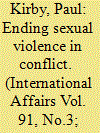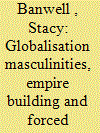| Srl | Item |
| 1 |
ID:
138944


|
|
|
|
|
| Summary/Abstract |
During the past year, the UK Government has become the lead advocate for a perhaps surprising foreign policy goal: ending sexual violence in conflict. The participation of government representatives from more than 120 countries in a London Summit in June 2014 was the clearest manifestation of this project. This article offers an early assessment of the Preventing Sexual Violence Initiative (PSVI) and situates it within the history of global action against sexual and gender-based violence from UN Security Council Resolution 1325 onwards, with a particular focus on three key developments. First, the PSVI has embraced the already common understanding of rape as a ‘weapon of war’, and has stressed the importance of military training and accountability. This has exposed the tensions within global policy between a focus on all forms of sexual violence (including intimate partner violence in and out of conflict situations) on the one hand, and war zone activities on the other. Second, the Initiative has placed great emphasis on ending impunity, which implicates it in ongoing debates about the role of international and local justice as an effective response to atrocity. Third, men and boys have been foregrounded as ignored victims of sexual and gender-based violence. The PSVI has been crucial to that recognition, but faces significant challenges in operationalizing its commitment and in avoiding damage to existing programmes to end violence against women and girls. The success of the Initiative will depend on its ability to navigate these challenges in multiple arenas of global politics.
|
|
|
|
|
|
|
|
|
|
|
|
|
|
|
|
| 2 |
ID:
139018


|
|
|
|
|
| Summary/Abstract |
Adopting a transnational feminist lens and using a political economy approach, this article addresses both the direct and indirect consequences of the 2003 war in Iraq, specifically the impact on civilian women. Pre-war security and gender relations in Iraq will be compared with the situation post-invasion/occupation. The article examines the globalised processes of capitalism, neoliberalism and neo-colonialism and their impact on the political, social and economic infrastructure in Iraq. Particular attention will be paid to illicit and informal economies: coping, combat and criminal. The 2003 Iraq war was fought using masculinities of empire, post-colonialism and neoliberalism. Using the example of forced prostitution, the article will argue that these globalisation masculinities – specifically the privatisation agenda of the West and its illegal economic occupation – have resulted in women either being forced into the illicit (coping) economy as a means of survival, or trafficked for sexual slavery by profit-seeking criminal networks who exploit the informal economy in a post-invasion/occupation Iraq.
|
|
|
|
|
|
|
|
|
|
|
|
|
|
|
|
| 3 |
ID:
171309


|
|
|
|
|
| Summary/Abstract |
By using the narrative approach and linking it to feminist research ethics and critical race methodology, this article seeks to understand how non-literacy and poverty hinder low-income women's access to justice and how these women experience the Moroccan state. The state here acts as an oppressive and marginalizing entity in women's lives, but also offers the potential for empowerment. This ethnographic study tells the stories of three victims of gender-based violence to demonstrate that the state needs to (1) set up an efficient and responsive infrastructure for those lacking know-how and money; (2) institute proper training of state agents for implementation of laws and to prevent them from acting on personal opinions and attitudes with regard to women's rights; and (3) strengthen procedures so that state agents can respond expeditiously to the needs and grievances of citizens.
|
|
|
|
|
|
|
|
|
|
|
|
|
|
|
|